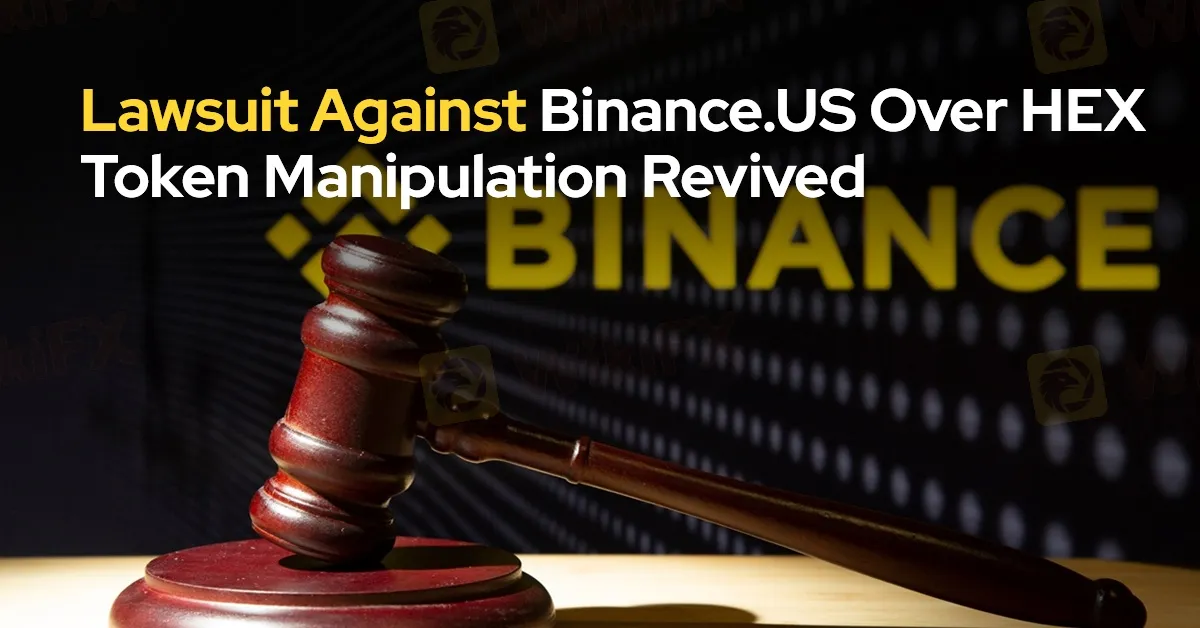简体中文
繁體中文
English
Pусский
日本語
ภาษาไทย
Tiếng Việt
Bahasa Indonesia
Español
हिन्दी
Filippiiniläinen
Français
Deutsch
Português
Türkçe
한국어
العربية
Lawsuit Against Binance.US Over HEX Token Manipulation Revived
Abstract:A U.S. appeals court has revived a class-action lawsuit against Binance.US, which accuses the cryptocurrency exchange of manipulating the HEX token’s price, reopening a legal battle involving significant financial claims and regulatory scrutiny.

A recent decision by a U.S. appeals court has brought new attention to a class-action lawsuit against Binance.US, alleging that the cryptocurrency exchange manipulated the price of the HEX token. On August 12, the Ninth Circuit panel overturned an earlier dismissal by a district court, allowing the case to proceed. This ruling is significant as it challenges the previous court‘s determination that there was not enough connection between Binance.US’s actions and the state of Arizona to justify the lawsuit.
The case, initially filed by Ryan Cox in 2021, accuses Binance Capital Management and Binance.US of manipulating the HEX tokens ranking on CoinMarketCap, a cryptocurrency tracking platform owned by Binance. Cox alleges that this manipulation resulted in HEX trading at a lower price compared to other Binance cryptocurrencies, which were given higher rankings.

The district court had dismissed the lawsuit in February 2023, ruling that Cox had not demonstrated a direct link between Binance.USs activities and the alleged price manipulation in Arizona. The court had applied a standard for “sufficient minimum contacts” that the appeals court found to be incorrect. The Ninth Circuit panel argued that Binance.US had significant enough connections with the broader U.S. to establish personal jurisdiction, even if the direct link to Arizona was not clear.
The Ninth Circuit's decision means that Cox's allegations of price manipulation are now recognized as valid, and the case will continue through the legal system. This development could have broader implications for how courts handle cases involving cryptocurrency exchanges and their practices.
In a related matter, the HEX token, which was introduced by Richard Heart in December 2019, is facing its own legal challenges. On July 31, 2023, the SEC filed a lawsuit against Heart, accusing him of breaching federal securities laws and defrauding investors of at least $12.1 million. The SEC alleges that Heart used investor funds for personal luxury purchases, such as a 555-carat diamond, expensive watches, and high-end vehicles.
The HEX token itself has seen a dramatic decline, currently trading at $0.004, a significant drop from its peak of $0.51 in September 2021. This decline underscores the volatility of cryptocurrency investments and highlights the ongoing legal and financial challenges facing those involved in the sector.

Disclaimer:
The views in this article only represent the author's personal views, and do not constitute investment advice on this platform. This platform does not guarantee the accuracy, completeness and timeliness of the information in the article, and will not be liable for any loss caused by the use of or reliance on the information in the article.
Read more

Crypto Influencer's Body Found Months After Kidnapping
The body of missing crypto influencer Kevin Mirshahi, abducted in June, was found in Montreal. A woman has been charged in connection with his murder.

Bitfinex Hacker Ilya Lichtenstein Sentenced to 5 Years in Prison
Bitfinex hacker Ilya Lichtenstein was sentenced to 5 years for stealing 120K Bitcoins as the cryptocurrency soars past $93K amid bullish market trends.

UK Sets Stage for Stablecoin Regulation and Staking Exemption
The United Kingdom is advancing its approach to cryptocurrency regulation with a specific focus on stablecoins and the potential exemption of staking services. British authorities are preparing new legislative measures to be implemented by December, aiming to bolster the nation’s appeal as a hub for digital asset innovation.

PayPal Expands PYUSD Transfers to Ethereum and Solana
PayPal's PYUSD stablecoin can now transfer across Ethereum and Solana, enhancing flexibility for users through a LayerZero cross-chain integration.
WikiFX Broker
Latest News
CySEC Warns Against Unauthorized Investment Firms in Cyprus
Why Even the Highly Educated Fall Victim to Investment Scams?
Warning Against Globalmarketsbull & Cryptclubmarket
Dukascopy Bank Expands Trading Account Base Currencies
UK Sets Stage for Stablecoin Regulation and Staking Exemption
Axi Bids AUD 52M to Acquire Low-Cost Broker SelfWealth, Outbidding Competitor Bell Financial
Crypto Influencer's Body Found Months After Kidnapping
STARTRADER Issues Alerts on Fake Sites and Unauthorized Apps
Italy’s CONSOB Blocks Seven Unregistered Financial Websites
Bitfinex Hacker Ilya Lichtenstein Sentenced to 5 Years in Prison
Currency Calculator


